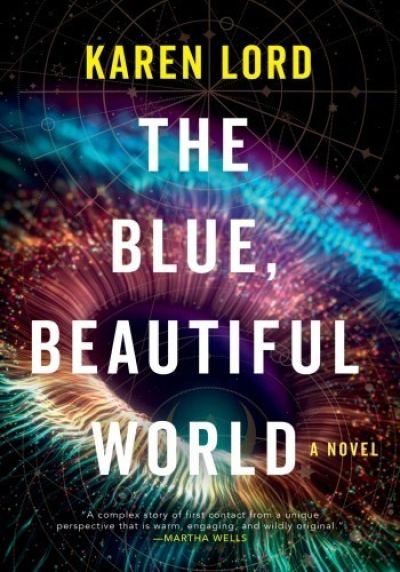From The Sky
The Blue, Beautiful World
By Karen Lord

11 Oct, 2024
Karen Lord’s 2023 The Blue, Beautiful World: A Novel is a science fiction first-contact novel. Or perhaps ‘dawning awareness’ would be more accurate than ‘first contact.’
Twenty-second-century Earth has any number of problems, none of which are sufficient to prevent a functional global economy or a thriving entertainment industry. Currently at the apex of that industry, the mysterious Owen.
Owen is not the most attractive pop-star to ascend to the heights of fame, nor is he the most talented musician. But Owen and his highly skilled team do excel at is applying the available resources to the ever-evolving challenges confronting them. Whether how to most effectively market Owen or dodging would-be assassins, Owen and his crew dance adroitly across the world stage.
Global Government Project’s inaugural Diplomatic Group has been handed an amusing assignment for their debut. Suppose for the sake of argument that Earth is only one of a number of technologically advanced planets, outdone in a number of fields by its neighbors. Further suppose that while Earth has been carefully kept in the dark about the other civilizations, those other civilizations have long been aware of Earth. How best to usher in an era of overt diplomatic contact?
The Diplomatic Group might be alarmed to learn that their assignment is not entirely fiction. In fact, it would be more accurate to describe it as entirely factual. There are many extra-Solar civilizations within communication distance of Sol. They are quite aware of Earth. Despite the official embargo, some extra-Solars have been interfering in Terrestrial politics for centuries.
Some, like the faction that is backing Owen, are benevolent. Others, like the Lyran cartels, see Earth as an easily-manipulated Terra Nullus, regardless of the official treaties. Which faction’s vision for Earth wins out may well come down to the novice Diplomatic Group’s ability to improvise on the fly.
~oOo~
I think 2700+ reviews into James Nicoll Reviews, regulars should not be surprised if what catches my attention is the story’s background.
Martha Wells’ blurb proclaims that this is a “a complex story of first contact from a unique perspective that is warm, engaging, and wildly original.” Original refers to the perspective, not the setting. The setting is very familiar. One might call it classic.
Although the extra-Solars refer to their weak interstellar government as “Galactic,” in fact their reach extends over a very small region of the galaxy, near Sol. The named inhabited systems:
- Our Solar System (0 LY),
- Alpha Centauri (4.3 LY),
- Epsilon Eridani (10.5 LY),
- Fomalhaut/Alpha Piscis Austrini (25 LY),
- Vega/Alpha Lyrae (25 LY),
- Pollux/Beta Geminorum (34 LY),
- 16 Cygni (69 LY (light years) distant from Sol),
- Epsilon Tauri (146 LY).
A sphere 150 LY in radius contains thousands of stars… which is an extremely minute fraction of the 400 billion stars in the galaxy.
As is typically the case in SF, these civilizations are of comparable technological and political1 sophistication, something whose mathematical improbability I would moan about except in this case the civilizations are also causally linked2: someone moved humans off-Earth to other worlds, and Lyrans have been manipulating Earth politics for two centuries3.
The interventionism (and the psionic powers I failed to mention above) recall Julian May’s SF. The setting itself is more reminiscent of de Camp’s Viagens setting, although I would be astonished if author Lord had heard of it. The protective embargo combined with the incessant interference with Earth is very reminiscent of the treatment to which de Camp’s planet Krishna is subjected.
The very significant difference is that it’s Earth, not some other alien world, that’s holding the sticky end of the stick. Although motives range from benevolent to exploitative, it’s aliens interfering in our governments and culture, not the other way around. It’s no coincidence that the Diplomatic Group was recruited from Terrestrial groups who had long experience with colonialism and recognize their past plight in Earth’s current circumstances.
Too bad that all the scene-setting doesn’t pay off. The novel invests a lot of time establishing the setting, the characters, and the crisis bearing down on Earth as the end of the embargo approaches. The actual resolution is bizarrely rushed, and less dramatic than one might except. Kudos to the shadowy figures of good for doing a decent job of preparation, I suppose, but it makes for an oddly anti-climactic experience.
The Blue, Beautiful World is available here (Amazon US), here (Amazon Canada), here (Amazon UK), here (Apple Books), here (Barnes & Noble), here (Chapters-Indigo), and here (Words Worth Books).
1: Speaking of politics, the most benevolent extra-solar government we see is a monarchal meritocracy.
2: Presumably, the someones who seeded humans on other planets were the same entities who ensured there were habitable planets around such unsuitable stars as Vega or Fomalhaut.
3: The book is set in the 22nd century, which means that we can blame the excesses of the 20th and 21st century on the Lyrans, but endeavours such as the annihilation of the Song Dynasty, the Mongol sack of Baghdad, the triangle trade, and the massacres in the Belgian Congo were purely human accomplishments. That said, mere chronological reality probably won’t prevent Terrans for blaming alien cosmicpolitans for stuff going back to the neolithic. That will be fun.
